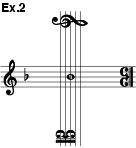
In German nomenclature, the letters of Bach’s name provide a motif (ex.1) which is frequently found as a germinal idea in musical compositions. It was used by Bach himself in the unfinished Contrapunctus XIV of the Art of Fugue (1751), and its possibilities were earlier mentioned in Walther’s Musicalisches Lexikon (1732/R). Probably because of the context in which Bach used it, later composers have mostly regarded this rather intractable motif as a challenge to their contrapuntal skill. Bach’s son, Johann Christian, and his pupil, J.L. Krebs, both wrote organ fugues on it, but its wider popularity follows the 19th-century Bach revival and the development of a harmonic vocabulary which could more easily accommodate its tonal ambiguities. Schumann, whose interest in letter-pitch equations is well known, wrote six fugues on B–A–C–H (op.60) for organ or pedal piano, and Liszt, Reger and Busoni also used the motif to raise imposing contrapuntal monuments to its originator. Other 19th-century composers who have used it include Rimsky-Korsakov and d’Indy.

The B–A–C–H motif is easily incorporated into a totally chromatic idiom and has been widely used by members and disciples of the Second Viennese School, e.g. by Schoenberg as an incidental theme in his Variations op.31 for orchestra and Third String Quartet, by Webern as the basic set of his String Quartet, and by Humphrey Searle as a motto in his First Symphony. For a list of over 400 B–A–C–H-inspired works see Boyd. The name B–A–C–H has also been expressed as a single note (ex.2).

S.W. Robinson: The B–A–C–H Motive in German Keyboard Compositions from the Time of J.S. Bach to the Present (thesis, U. of Illinois, 1972)
U. Prinz, J. Dorfmüller and K. Küster: ‘Die Tonfolge B–A–C–H in Kompositionen des 17. bis 20. Jahrhunderts: ein Verzeichnis’, 300 Jahre Sebastian Bach (Tutzing, 1985), 389–419 [exhibition catalogue]
W. Häcker: ‘Erberezeption im Sozialismus: das Tonsymbol B–A–C–H im Musikschaffen der DDR’, BMw, xxxi (1989), 266–78
M. Boyd: ‘BACH’, Bach, Oxford Composer Companions (Oxford, 1999)
MALCOLM BOYD